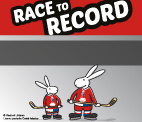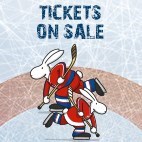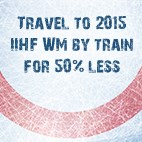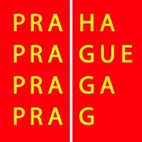Darzins dares to dream
Darzins dares to dream
Latvian star talks Sochi, Daugavins and more

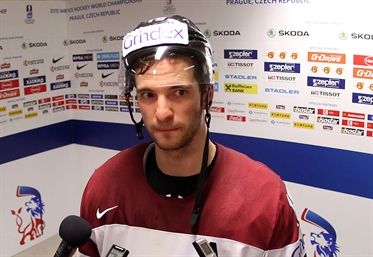 Lauris Darzins answers the questions before the relegation battle with France. Photo: Andre Ringuette / HHOF-IIHF Images
Lauris Darzins answers the questions before the relegation battle with France. Photo: Andre Ringuette / HHOF-IIHF Images
The gifted 30-year-old forward is playing in his eighth IIHF Ice Hockey World Championship. Last year, Darzins was catapulted into the global spotlight when he beat superstar Canadian goalie Carey Price on a spectacular breakaway in the 2-1 quarter-final loss at the Sochi Olympics.
We caught up with the outgoing Dinamo Riga captain on the eve of Latvia’s crucial round-robin closer.
Heading into your last game against France, how do you feel about the team’s overall performance?
The positive thing, I think, is we’re playing better and better throughout the tournament. We have a young team this year. Obviously, as a team, we were not that experienced in the World Championships, because we had a lot of first-timers. And we’re up against Team Canada, Sweden, and the Czechs, who are trying to win the gold this year. But it was a good lesson for us.
I think the last three games we played against teams whom we were able to beat. We managed to get two wins out of these three games. Obviously we wanted even more, but at the end of the day, two wins against three opponents who are good too, it’s not that bad. We had a lot of mistakes still in those games, but a win is a win. Unfortunately, we have lost our chance to make the quarter-finals. But now we have a huge game against France. We don’t want to get relegated.
One bright spot for the team has been the chemistry between yourself and Kaspars Daugavins. What makes him such a good partner for you?
Latvia doesn’t have that many hockey players. When we grew up, we were always somewhere together, whether it was the junior national team, the men’s national team, or another team.
So you get that feeling that you know what he’s going to do. You’ve been around him so much, and you know him as a player. He’s a really good player. I would want to think that we have a certain style, the way we play, our national team. So there is that feeling, even if I don’t see him, that I know he’s going to be in that spot.
He always goes to the net. He likes to score goals, and obviously if I have the puck and I pass to the far post, there’s a 90 percent chance that he’s going to be there. He’s having a really good tournament. He’s our captain. He’s leading us and he has two overtime goals. I’m really proud of him.
How would you describe the approach Alexander Beliavski takes as your new national team coach?
I think he’s doing a really good job for his first tournament. Obviously, experience is going to come more and more. But I think he’s making all the right moves. Out of the few options he has, he makes the right move. He’s talked a lot with some of our previous coaches, like Oleg Znarok, who’s now a really successful coach. So I bet he can learn from him too. He was around the national team when Curt Lindstrom was the coach. So I think he’s been around good coaches.
With his smartness, I think he develops this good mix out of somebody else’s experience. Every coach has his own style, and I think it’s positive that already at this point he has his own style.
Does he ever show you that famous spinnerama move he pulled off as a player at the 2000 World Championship when he scored against Belarus?
[laughs] Well, he doesn’t have to show it! It’s legendary. I think all the Latvians know it. Against Belarus it was always a big game for us at the World Championships, and he did this spinnerama. I remember all that tournament, he had a great tournament. He was scoring basically every game.
The spinnerama is awesome. Some guys have tried it, but maybe even if it works, it’s tough after that move to make such a great shot and put it right in the corner like he did. It’s just an amazing move. In the modern era, where YouTube is popular, I bet if you would make a move like that, you’d get 50 million hits right away!
Let’s talk about your history. What was it like for a kid growing up in Latvia when the Soviet Union had just come to an end trying to become a hockey player?
The positive thing was that the Soviet Union had a really good hockey sense. Hockey was big. The coaches who took care of us were products of Soviet Union hockey. That was good for us young guys. I think it was a good school for us. We had this style of game that we could take from the Soviet Union.
But obviously, our country was young and we just got freedom, which is awesome. But it was tough. There were only one or two ice rinks in the whole country. Even if we had good coaches, the main problem was that not a lot of people could afford to raise a child as a hockey player. So we didn’t have many teams.
For a hockey player, you’ve got to practise a lot, but you’ve also got to start playing some games. When you only have two or three teams in the whole country, it’s hard, because you need to challenge somebody every day to learn how to win hockey games. Obviously now, thanks to the national team, hockey has become more popular. More and more kids go to hockey. There are more ice rinks. So they can challenge themselves against each other and they become better.
Your journey took you from Lukko Rauma in Finland to the Kelowna Rockets of the Western Hockey League. How did that come about?
I had to go to Finland just to develop as a hockey player. If you stayed back home, you would stay just at one level. I had a successful run in Finland. After that, I got drafted, and obviously I wanted to pursue my goal to play in the NHL.
Nashville, who drafted me, were interested in bringing me over to North America. So I was lucky enough to get drafted by the Kelowna Rockets. They were the Memorial Cup champions at the time. It was a great organization to go to. I was happy. Those were a good two years in my career. There were obviously ups and downs. I had shoulder surgery in Canada, but it was the right move at the time.
Was it hard for you to go and live in Kelowna on the other side of the world with a new culture?
You know, at that time, it just felt like the right move. Now as a 30-year-old, I think it’s pretty crazy! I guess when you’re younger and you’re still a teenager, it was like, “Oh, it’s easy.” But now when I look back, I think it’s pretty tough for a kid to go away that far. But I had a great billet family. I stayed in a really nice place and they made me feel at home. So thanks to them.
You were the overtime hero in the 2005 WHL playoffs a couple of times as well.
You know, my love for the game hasn’t gone anywhere. I still love to score goals and particularly big goals. It’s very nice to score. But obviously when it’s junior hockey, there’s so much emotion. It was great. We had a good playoff run. We won the league. Unfortunately we didn’t win in the Memorial Cup. But it was great. It was the lockout year in the NHL and all the attention was on the junior hockey.
You had some great teammates with the Rockets: Alexander Edler, Thomas Raffl, Blake Comeau, Kyle Cumiskey, and of course, Shea Weber. What was Weber like back then?
Right away, you could tell he was a leader. I think he was already NHL-ready at the time I was there. He was the same age, 19, but he could easily lead an NHL team at that time too, because he was really physically ready for men’s hockey. His hockey sense was unbelievable. It’s the complete package. He could play power play or PK, and there was no doubt about it. He could make good plays 5-on-5 too.
When you think about it, is it strange that both you and Weber ended up scoring in Canada’s 2-1 win over Latvia at the Sochi Olympics last year? What are the odds?
Yeah, but on the other hand, the hockey world isn’t that big. Right now, I have friends basically on every national team whom I played with somewhere. There are a lot of players I know. But it’s kind of funny. We sure talked after the game. I don’t know. I guess that’s what sport is all about. You never know what’s going to happen. What are the odds, right? But it happens. That’s what’s fun.
Do you have a favourite memory from playing for Latvia?
Most recently, I would say our best achievement has been the Sochi tournament. We won only one game, but we played well in the first game against the Swiss, then the Czechs and Swedes. They were all tight games. To get in the quarter-finals, we had to beat the Swiss and we did that. We had a chance even in the Canada game. Obviously they were playing great that game. But one bounce there and everything can happen.
The tournament was great. We had such a good team, and finally everyone was healthy. We didn’t really have injured guys – maybe one or two. At that time, we made the best team we could. We had a good mix of older and younger players. So now Sandis Ozolins is finished, but in that tournament he was there with guys like Zemgus Girgensons, and that’s not going to happen anymore. That was just the right moment at the right time. Obviously the Olympic Games are special. It was special for me to play in Vancouver too.
Also, I made my debut with the national team when the World Championship was in Riga in 2006. So I’d say both my Olympics and the home tournament were tops.
The opening game of the 2006 Worlds, with Latvia tying the Czech Republic 1-1, had to be one of the loudest arenas in the history of international hockey.
It was really loud. At that time, they allowed those horns. Actually, I’m not a fan of those. I couldn’t hear even the referee. I prefer it when the fans shout and cheer and sing some songs. It’s much more fun than just doing those horns. As for loudness, definitely, it was the loudest. Ten thousand people and everybody had a horn. It was crazy.
Girgensons was voted to the NHL All-Star Game starting lineup this year, with a ton of support from Latvian fans. Did you vote for him?
[laughs] No. A lot of media back home asked the players too, “Did you vote for Zemgus too?” I don’t know about the other guys, but for me, I explained that I didn’t vote because, maybe it’s going to sound weird, but did he want to be there? If I knew he really wanted to be there at this time, I would vote for sure, because he’s a great guy. He was a great teammate. Obviously I wish well for him. But I didn’t know if he really wanted to be in the All-Star Game in the starting lineup at his age. How’s he going to handle all the stuff that happens with the media questions and stuff like that? I wasn’t sure he wanted it, so I didn’t vote.
How do you feel about Dinamo Riga’s future in the KHL?
The city loves the team. I wish we continue to play in the league, because I love it. It’s my home city. To play back home in front of your family and home crowd, it’s awesome. Hopefully everything goes smoothly. There are a lot of teams experiencing budget problems. Hopefully Riga will find money and participate in the league.
I think, not only Riga fans, but throughout the league, they’ve started to love Dinamo. We have had some really good playoff series against top teams. We’re a team in the league that can win some big games. We’ve just got to keep on working to have that level all season.
Who’s your best friend in hockey?
We have a really friendly team. That’s the fun part, because we don’t have that many hockey players. I know a lot of these guys for 10 or more years. My roommate is Armands Berzins. We’re really close friends, off the ice too. In the off-season we go golfing. I’d say he’s my closest friend. But the team overall has really good chemistry and is really friendly.
So is golf one of your favourite hobbies?
Golf and tennis. That’s basically it. I just like those sports. I like Roger Federer. Unpopular choice, I bet! [laughs] I like his style of play. He’s amazing. I’m planning to go to France in the off-season. I checked the time and Roland Garros [the French Open] is on then. So I wish I’m going to see Roger Federer play.
What’s your favourite music?
It depends on the time of day, I guess. Before a game, I like techno. But techno is like a simple answer. For electronic music, there are so many ways. I like when it has a beat to it, and when it’s not just like “boom boom boom,” but it has that energy. Obviously, if it’s night time and you want to relax, it’s something more easy. I guess I’m not a fan of rap music and country. Other than that, it depends on the mood. For now, before games, I like those DJs like Tiesto and Avicii.
Finally, what do you expect from your game against France on Tuesday?
It’s going to be tough. We played two exhibition games against France before the tournament, and we lost both of them. But when it counts, I think we have won more than we’ve lost. We lost to them in overtime in the Olympic qualification, but still, it was like a win for us because we only needed a point. So that was a good game for us. We’ve beaten them a lot of times in the World Championship. In recent years, they have a really good team. It’s always tough to play against them. I hope we’re going to follow the game plan, and then everything should be fine.
Back to Overview





















































